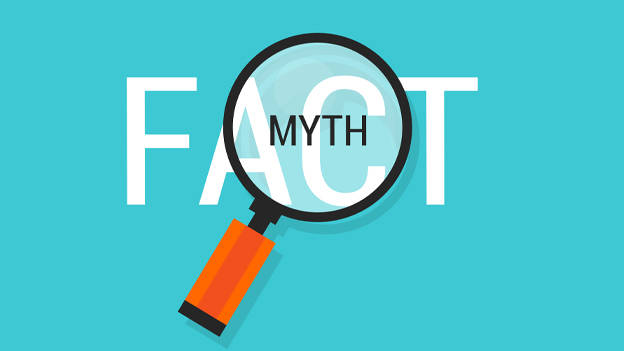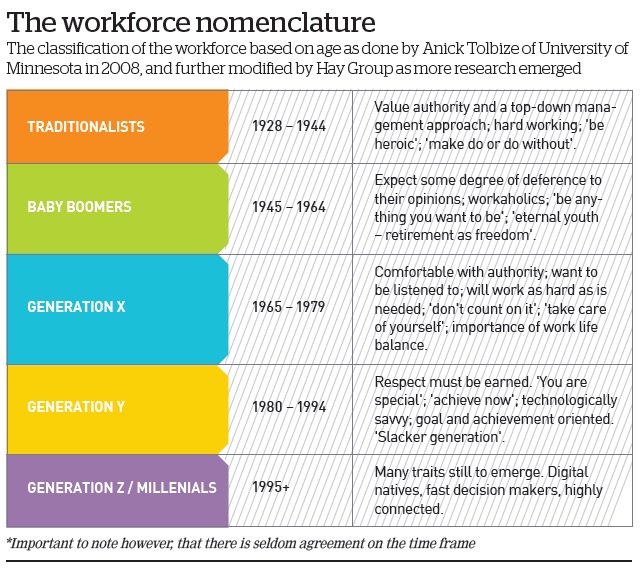It’s time to bust the HR myths

Most millennials expect face time with their managers and colleagues. Close to 70 percent of them believe that technology cannot replace the human mind
Businesses need to think of work as an extension of life & make life meaningful; & work will sort itself out
There are many myths that are being propagated in the HR circles nowadays which, if not nipped in the bud, have the potential to divide the workforce, make organizations assign their bandwidth and resources disproportionately, and create an environment of competition when collaboration is the key to success. Out of context bench-marking, scouting for best practices that may not fit in, targeting engagement nirvana by trying to do everything, well, it's all downhill. In this article, I will focus on just two aspects.
1. The myth of the multi-generational workforce
One of the main themes many HR managers are fad-surfing this year is the need to engage the so called millennials. There is copious amount of research being done on the subject. A lot of linkage is being established between the growth of the digital ecosystem and the consequent emergence of a 'different from others being' called millennial. Data is being thrown around and represented/misrepresented, interpreted/misinterpreted. New discoveries are being made like rabbits from a bowler hat!
- A certain significant percentage of millennials would like flexibility in work routine. Show me someone who wants rigidity?
- Millennials want to be recognized and rewarded. Really, and others don't?
- They want to be supported and appreciated for their efforts and want to be part of a team? Insignificant others from other generations therefore must be disruptive, immune and indifferent?
Yes, there is a multi-generational workforce at workplace, I am not brushing aside that fact. In fact most commentators on the subject will agree to the following classification byAnick Tolbize of University of Minnesota in 2008, modified by Hay Group as more research emerged*:

However, many of the stereotypes about the group under current focus – the millennials are untrue. According to a PwC study, most millennials, despite their digital comfort, expect face time with their managers and colleagues. In fact close to 70 percent of them believe that technology cannot replace the human mind.
Let us take a deep breath and consider this; every generation has had constructive differences of opinion with the previous generation. There is nothing unique, nor anything of undue concern in this. This is just a part of the evolution journey which humans must live through their personal as well as their work life. At one point in time it was baby boomers versus the traditionalists era workforce, then it became Gen-X and baby boomers followed by Gen-Y, and Gen-X and more recently it is Millennials and Gen-Y.
Of course there are going to be differences, of course the latest generation to enter the workforce will be different and will see things in a new light, of course new opportunities for need-creation and hence consumer engagement will present themselves. This calls for even more integration, even more mainstreaming, and even more negotiations to get everyone to collaborate.
The other aspect of this is the fact that there will always be rebels and abundantly, in every generation who do not comply with the generational norms and behave ahead of their times. In fact it is these rebels who blaze the trail for future generations.
Hay Group in a thought paper titled “Managing a multigenerational workforce: the myths vs. the realities" found the following about two key aspects of managing an organization's people:
Positivity at the workplace: “However, whilst Gen-Y has the lowest positivity rating in the workplace, Gen-X and the Baby Boomers are not far behind. Also, we're looking at global data here. Defining experiences shared by generations may be different across countries and cultures, diluting the impact of any generational effects. This suggests that generational differences do not account for the difference in expectations.”
“However, this doesn't fully account for the way in which current influences are impacting different generations. While Gen-Z – the digital natives – may be better equipped for today's workplace, thanks to changes in the education system, what explains the more positive perceptions of the Traditionalists? This suggests that period differences do not account for the differences.”
Leadership: “We have seen a distinct pattern emerge when looking at the experiences and expectations of different generations in the workplace. However, when it comes to what people are looking for from their actual leaders, there are very few differences… Leaders don't need to develop generation specific skills. They should be able to adapt leadership styles to suit the individual.”
The challenge therefore is not so much about how we treat people differently, but how we celebrate the differences and still treat everyone the same. Equity cannot be sacrificed at the altar of differentiation.
To spend energies on those questions where even if we find an answer which demands differentiated treatment, we just won't have the resources to do so and may precipitate intergenerational rivalry instead, how smart is that?
2. The myth of work-life balance
Another myth that HR has now started wasting time on is the myth of work-life balance. There is no such thing. Work is an integral part of life and most people work to have a life. No one lives so that s/he can spend the entirety of living on working.
Forbes magazine, in its article “Overcoming the destructive myth of work-life balance" has this to say, “The idea is that you can compartmentalize everything into either 'work' activities (work, meetings, trips, conferences) or “life” activities (spending time with family, staying out, eating right) and by doing so 'have it all.' In practice, though, this theory falls apart. The problem with the 'work/life balance;' work usually ends up coming first, neglecting life entirely. And when you neglect life, it comes back to bite you in the butt.”
Harvard Business Review in an article titled “The myth of work-life balance” goes on to add that “Under continued stress an executive loses his or her perspective on issues and the ability to look at problems creatively. Molehills become mountains. Conflict with colleagues becomes personal. The ‘flat spots’ of our personality, such as, arrogance, inflexibility, aversion to risk or a tendency toward negativity, become evident. And most of us revert to tried and true solutions — the enemy of breakthrough strategies and new innovations.”
The fact is, those employees who have little personal issues to think of at work are the most productive. Hence, it is worthwhile for businesses to think of Work as an extension of Life and do everything in their power to make life as meaningful as possible and work will mostly sort itself out.
We can look at a series of such myths and folklores to continue this conversation, but another aspect that is important for us to consider is that while getting HR right, it's also important to keep our goals manageably short and hence a request to kill the above two myths first. It is important to focus on the fundamentals of HR, getting the basics right, and strengthening the HR presence on the decision making table.
What is required is a Best Purpose approach to HR. In this approach, instead of aligning ourselves to practices of other organizations which may work in their unique context and may be abject failure under our own significantly different context, or maybe downright flawed, we must discover our own need and find a set of purpose-led people practices.












